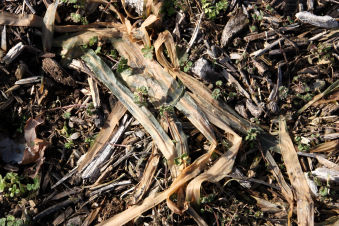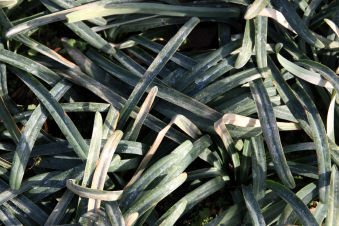| « FreezePruf™ - A Quick Summary | Things Happening At Bulbmeister Nursery » |
Improving Winter Hardiness Of Winter Foliage Lycoris
Sometime in the summer of 2009, I was made aware of a new product coming to market, offered under the label, “FreezePruf™“, which was touted to be able to protect, by a difference of over 9°F, plants susceptible to winter damage. As an example, by definition, if I was growing a plant that would receive cell damage starting at 32°F, the use of this product would protect the plant from the same damage down to under 23°F. Well! Now, I thought to myself, “Wouldn’t it be great if this product really works and could protect some of my winter foliage Lycoris from significant winter injury?” I decided to order a gallon of this product, enough to make 4 gallons of solution, and test it on a number of my small Lycoris plots this winter. Little did I know our region of the country would be the recipient of some of the coldest temperatures we have seen in 15 years. But, that’s getting ahead of the story.
The detailed report can be read under the title, “A Practical Evaluation of FreezePruf™“, in the “Growing Guide” section of the Bulbmeister.COM website. The information will include generalized temperature data and environmental conditions, as well as the procedure followed. Additionally, 14 other plots are featured.
Following are images and descriptions of the worst and best performing accessions in the study. Photographs and evaluations were taken on January 18, 2010.
WORST CASE |
BEST CASE |
OUCH! This most tender member of the Lycoris clan proved it needed far more than a spray protectant to survive. Foliage was completely burned back. This plot was in open ground in full sunlight. |
This open ground plot in full sun received minimal damage, one of the most impressive subjects in the trial, with foliage even more upright than other plots. Please note that the residue of the first treatment is still obviously present on the foliage. |
CONCLUSIONS
Realizing that this is only a practical, subjective study, I believe FreezePruf™ deserves further evaluation by myself as a nursery grower. Based upon the expected behavior of the Lycoris radiata group and L. xalbiflora, I have noted what appears to be significant protection from very drastic low temperatures, not normally recorded for this area of the country. Additionally, a proper application to the underside of the foliage was not feasible, nor was the scheduled second application possible before the lowest temperatures were observed. An additional application was applied to surviving plots on January 18th after the photographs were taken. This product will probably be applied again next year in the hopes of evaluating under more normal circumstances and with a properly timed second application.


